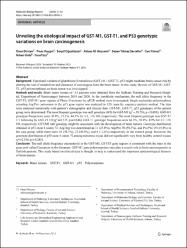Unveiling the etiological impact of GST-M1, GST-T1, and P53 genotypic variations on brain carcinogenesis

Göster/
Tarih
2024Yazar
Dirican, OnurKaygın, Pınar
Oğuztüzün, Serpil
Husseini, Abbas Ali
Yılmaz Sarıaltın, Sezen
Yılmaz, Can
Ünlü, Nihan
İzci, Yusuf
Üst veri
Tüm öğe kaydını gösterÖzet
Background Functional variants of glutathione-S-transferase (GST)-M1, GST-T1, p53 might modulate brain cancer risk by
altering the rate of metabolism and clearance of carcinogens from the brain tissue. In this study, the role of GST-M1, GSTT1, p53 polymorphisms on brain tumor was investigated.
Methods and results Brain tumor tissues of 143 patients were obtained from the Gulhane Training and Research Hospital, Department of Neurosurgery between 2019 and 2020. In the xenobiotic mechanism, the null allele frequency in the
GST-T1, GST-M1 gene regions of Phase II enzymes by qPCR method were investigated. Single nucleotide polymorphism
encoding Arg/Pro conversion in the p53 gene region was analyzed in 120 cases by sequence analysis method. The data
were analyzed statistically with patient’s demographic and clinical data. GST-M1, GST-T1, p53 genotypes of the patient
group were determined. The most frequent genotype was null genotype (0/0) for GST-M1 (χ2=39.756, p<0.001). GST-M1
genotype frequencies were 30.8%, 23.1%, 44.3% for 1/1, 1/0, 0/0, respectively. The most frequent genotype was GST-T1
1/1 following by GST-T1 1/0 (χ2=0.335, p=0.846). GST-T1 genotype frequencies were 64.3%, 30.8%, 4.9% for 1/1, 1/0,
0/0, respectively. GST-M1 null genotype might be associated with the development of brain tumors. Genotype distribution
obtained in p53 exon 4 codon 72; Arg/Arg was determined as 31 (25.8%), Arg/Pro 70 (58.3%), and Pro/Pro 19 (15.8%) in
the case group, while there were 18 (38.3%), 23 (48.9%), and 6 (12.8%) respectively in the control group. However, the
genotype distribution of p53 exon 4 codon 72 among tumorous tissue did not significantly vary from healthy control tissues
(χ²=2.536, p=0.281).
Conclusion The null allele frequency encountered in the GST-M1, GST-T1 gene regions is consistent with the rates in the
gene pool called Caucasian in the literature. GST-M1 gene polymorphism may play a crucial role in brain carcinogenesis in
Turkish patients. This study based on clinical data is thought to help to understand the important epidemiological features
of brain tumors.
















